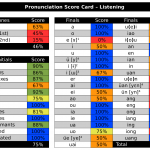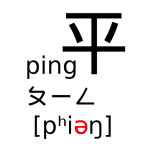Articles tagged with ‘Pronunciation’ Page 5
-
Training and testing your ability to hear Mandarin sounds
Learning to hear the sounds in a new language is a very important step, both to understand it and to pronounce it yourself. This article gives you methods and tools for training and testing your ability to hear the sounds of Mandarin.
Read → -
7 kinds of tone problems and what to do about them
Tones are tricky to learn and students often encounter many different kinds of problems. Since the solution to them are very different, it’s important to understand what the problem actually is before you try to do something about it!
Read → -
Learning tones in Mandarin is not optional
Learning tones in Mandarin is not optional. The longer you wait before paying attention to tones, the more you will have to relearn later. If you don’t know the tone, you don’t know the word. It takes time to learn to hear tones and treat them as integral parts of syllables, but the sooner you start, the better.
Read → -
Learning to pronounce Mandarin with Pinyin, Zhuyin and IPA: Part 3
As adults, understanding is important when learning pronunciation. One way to achieve this is through the International Phonetic Alphabet (IPA), which will allow you to see the sounds your ears might fail to hear. Learning IPA also means learning basic phonetics, and that will do you good in the long run!
Read → -
Improving pronunciation beyond the basics
Learning pronunciation beyond the basics is about knowing where you want to be and where you are now. Then you identify which problems keep you from reaching your goal, and solve them one by one in order of importance. This starts with high-quality practice where you learn to pronounce something correctly, then moves to high-quantity practice where you gradually decrease the effort needed to get it right. After a while, no effort will be required and you will have successfully improved your pronunciation!
Read → -
Can native speakers be wrong about Chinese grammar and pronunciation?
What does it mean when something is said to be “correct” in Chinese? Who’s right if all the people around you say something, but the dictionary says something else? Mandarin is a huge language spoken my a very large number of people, so some variation is to be expected. This article is about the flexibility of Mandarin and how to deal with it as a student.
Read → -
Learning to pronounce Mandarin with Pinyin, Zhuyin and IPA: Part 2
Which transcription system should you use for Mandarin Chinese: Pinyin, Zhuyin or perhaps IPA? Which system you start out with isn’t extremely important, but if you care about pronunciation, it certainly helps to learn more than one system. In this article, I discuss the pros and cons of all three systems and offer some advice about learning pronunciation.
Read → -
Learning to pronounce Mandarin with Pinyin, Zhuyin and IPA: Part 1
Learning to pronounce Mandarin involves several steps. You need to first discriminate between and then identify the sounds, but you also need to be able to write them down and also be able to read how words are pronounced. In this article, I discuss this process and how you should go about it. It also contains advice for what to avoid!
Read → -
Focus on initials and finals, not Pinyin spelling
Instead of worrying too much about Pinyin spelling and what sounds each letter represents, students of Mandarin should zoom out a bit and focus on initials and finals as whole units. There are only around 60 of them and focusing on them will pay off handsomely.
Read → -
Improve your pronunciation with the Hacking Chinese pronunciation check
I’ve found that pronunciation is one of the most neglected areas in Chinese language teaching. Teachers don’t have the time or don’t know how to teach it properly. This means that students are left with bad pronunciation, often without knowing it. The goal with this course, which is now open for limited testing, tries to address this.
Read →








